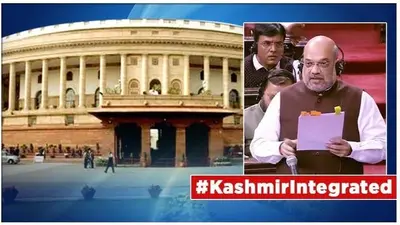Updated 5 August 2019 at 13:25 IST
J&K, Ladakh bifurcated as Union Territories: Here is what it means
Home Minister Amit Shah moved a proposal in the Rajya Sabha to bifurcate Ladakh, Jammu, and Kashmir into Union Territories. Here is what bifurcation means
- India News
- 0 min read

Home Minister Amit Shah moved a proposal in the Rajya Sabha to bifurcate Ladakh, Jammu, and Kashmir into Union Territories.
He further proposed that Jammu and Kashmir will be with legislature.
The statement read, "Further, keeping in view the prevailing internal security situation, fuelled by cross border terrorism in the existing state of Jammu and Kashmir, a separate Union Territory for Jammu and Kashmir is being created. The Union Territory of Jammu and Kashmir will be with the legislature."
What does bifurcation mean?
The Union Territory status to Kashmir will allow New Delhi to retain law, order and have complete control over the security of the valley.
Advertisement
Bifurcation would also mean the individual upliftment of Jammu and Ladakh, which have been collateral in terms of suffering on the development front because of the constant cross border terrorism in Kashmir, by Pakistan backed terror outfits.
With this move, they will ensure that a circumference is created to concentrate efforts in terms of policies, development and eradicating terror. It will also work towards bringing an end to the regional disparity.
Advertisement
The Union Territory status of Jammu and Kashmir, in particular, would operate like the national capital Delhi, union territory Puducherry, wherein each has a legislative assembly and council of ministers. Moreover, certain categories of Bills will require the prior approval of the Central government for introduction in the legislative assembly.
Currently, Jammu has 25.93% (26,293 sq km) the area and 42.89% of the population. Kashmir has 15.73% (15,948 sq km) area, and 54.92% of the population while Ladakh has 58.34% (59,146 sq km) of the area and for 2.18% of the population. Through this move, Ladakh, which has consistently been treated as a pariah will get an identity of its own while Jammu will be on equal footing with Kashmir.
Along with that, following the motion to revoke Article 370 in the Rajya Sabha, comes another huge development in the Jammu and Kashmir. The Government of India is planning a massive investment summit in Kashmir in October, sources say and the idea is anyone who wants to invest there, build an industry can buy property can now do so.
Owing to the Article 370, which gave the state a separate identity and provisions, also created hurdles for opportunities for financial growth.
As per the provisions of the article, the Parliament needs the state government's concurrence for applying laws except for defence, foreign affairs, communications and finance. Hence, the residents of the state live under a separate set of laws, including citizenship, ownership of property, and fundamental rights, in comparison to the rest of India. Under Article 370 provisions, Indians from other states are forbidden from purchasing property in Jammu and Kashmir.
Published By : Aishwaria Sonavane
Published On: 5 August 2019 at 12:28 IST

